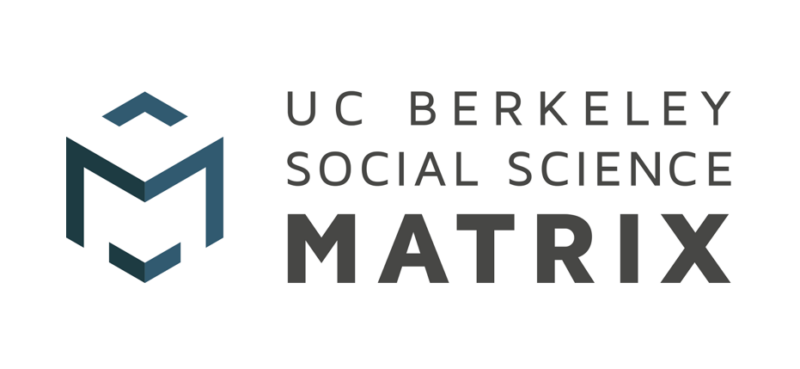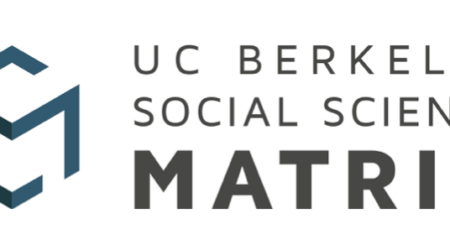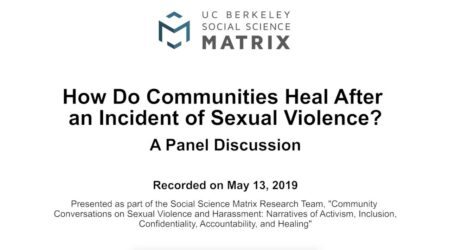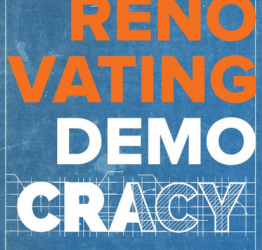How do politics and economics relate to the technical development of artificial intelligence? How does the concept of “resilience” serve as a practical framework for managing climate change? What are the roles of freshwater institutions in creating, dismantling, and/or transferring wealth and power?
These are among the questions that will be explored by Matrix Research Teams during the 2019-2020 academic year. Matrix Research Teams are groups of scholars who gather regularly to explore or develop a novel question of significance in the social sciences. Matrix teams typically integrate participants from several social-science disciplines and diverse ranks (i.e. faculty and graduate students), address a compelling research question with real-world significance, and deploy or develop appropriate methodologies in creative ways.
Matrix supports three different kinds of Research Teams: Project Teams receive funding in the amount of $5000. They run for two semesters, meeting at least once a month around a defined research problem. Project teams work toward producing a particular output, such as a proposal for external funding, a workshop or conference, or a joint publication. Prospecting Teams receive funding in the amount of $1500. They run for a single semester, typically meeting 5-6 times, and explore a new area or question of inquiry and assess whether it has potential for further investigation. Progress Teams, added this year, receive $1500 in funding to continue the progress they made during the prior academic year as a Prospecting Team.
In addition to funding, all Matrix Research Teams receive administrative support in coordinating, scheduling, and reserving space in our offices on the top floor of Barrows Hall. Matrix also provides communications support to help publicize each group’s work; the teams receive assistance administering funding, as well as identifying and applying for further funding.
This year’s teams were chosen following review by a cross-disciplinary panel of faculty members. Below are descriptions of the 2019-2020 Matrix Research Teams, based on abstracts written by the teams’ organizers.
Project Teams
Berkeley Infrastructure Initiative: Collaborative, Interdisciplinary Policy Research in the Public Interest
Team Leads: Karen Trapenberg-Frick, Professor, City & Regional Planning; Jeff Vincent, Researcher, Institute of Urban & Regional Development
Co-sponsored by Global Metropolitan Studies, this Matrix team aspires to lay the foundations for a “Berkeley Infrastructure Initiative,” (BI2), which will bring together faculty and students with a shared interest in the planning, governance, finance, design, development, economics, and environmental effects of infrastructure. Sub-sectors of interest include transportation, housing, water, sanitation, information and communication technology, energy, school and community facilities, and public parks. “New and expanded research is needed to guide public infrastructure policy, investment and delivery amidst changing domestic and international landscapes,” the organizers explained in their proposal. “But widespread social benefit will only be realized if infrastructure investments are planned in a manner prioritizing equitable access and reducing externalities that place disproportionate burdens on already disadvantaged groups. Thus, objective, empirically-guided knowledge is needed on how to equitably provide and effectively deliver infrastructure services. Our team will incorporate a strong equity lens into our empirical work. Through this proposal, the Research Team will develop a landscape framing paper outlining the state of the field and research needs, convene a conference with leading scholars, develop a strategic plan to seek extramural and campus funding support, and actively disseminate our research and findings. Through these efforts, UC Berkeley will be well-positioned to have significant impact in scholarship and practice.”
Climate Economics
Team Lead: David Anthoff, Assistant Professor, Energy & Resources Group
The field of economics plays a crucial role in the debate about appropriate policies intended to mitigate climate change. For example, the tools of economics can be used to measure and/or estimate impacts such as the costs of mitigation, the valuation of damages, the role of abatement in lowering damages, design of policy instruments (e.g. taxes vs. permit systems), international agreements on climate policy, risk assessment, questions of distributional ethics, and more. With financial support from SAGE, Matrix will continue to support a team dedicated to Climate Change Economics, which brings together some of the many faculty, post-docs, and Ph.D. students at Berkeley who are working on economic aspects of climate change. This group’s regular meetings serve as a convening ground for researchers from across the UC Berkeley campus, and provide a space for scholars to share early research drafts, discuss recent literature, consider special topics, and bring in external speakers. Matrix also previously hosted an Advanced Workshop on Climate Economics.
Native/Immigrant/Refugee: Movements Across Contested Grounds
Team Leads: Beth Piatote, Associate Professor, Native American Studies; Leti Volpp, Professor, School of Law
In the current moment of resurgent populist nationalism, understanding how rhetorical and legal claims are made about the “native,” “immigrant,” and “refugee” is an urgent project of critical social importance. Understanding the complex nature of these categories in relationship to each other—as by turns antonymous, overlapping, oppositional, and precarious—even as the laws and policies that define them shift, is the central concern of this research team. Each category is entangled with the others and operating in a state of flux, disrupting or securing the lives of millions. While many scholars focus their research on immigration, on refugees, or on indigenous issues, this work is conducted in silos with minimal conversation and collaborative research across these fields. This research team disrupts this silo effect by staging cross-disciplinary and cross-category conversations. The team is planning conference to be held in March 2020, to be followed by the production of a scholarly volume.
Queer Ecologies | Feminist Biologies
Team Lead: Ashton Wesner, PhD Candidate, Environmental Science, Policy, and Management (ESPM)
How do scientists engage queer feminist methodologies to understand sex and gender in non-human animals? Animal research—including studies of sexual selection, mate choice, and social pairing—has long been used to make inferences about human biology, health, and sociality. Reciprocally, cultural norms infused with political, social, and economic assumptions also influence the ways in which scientists study animals. This team of biologists, social scientists, and humanities scholars investigates how heterosexist ideologies have shaped evolutionary biology and behavioral ecology, as well as how queer and feminist scientists today generate practical and theoretical interventions to unsettle normative canons. By using “queer nature” as an intellectual starting point, the team aims to re-organize the longstanding whiteness, gender dimorphism, and heteronormativity of Euro-American biological disciplines. They will develop pedagogical tools and interdisciplinary methodologies that address questions of teaching and understanding biology “queerly.” This work includes public-facing material like podcasts, course syllabi, academic programming, and co-authored publications.
Progress Teams
Interpreting Risk in the Age of Direct-to-Consumer Genetic Health Testing
Team Lead: Skyler Wang, PhD Student, Sociology
Following the success of genetic ancestry testing, direct-to-consumer (DTC) genetic health tests are on a rapid rise. 23andMe, Veritas, and Genos are just three of many companies ushering consumers to a new age of neoliberal healthcare management. These at-home tests promise accurate predictions of health problems, ranging from ‘lifestyle’ concerns such as how much one should drink to predictions of diseases such as cancer and diabetes. The rise of DTC tests brings about a new cultural phenomenon: the expansion of ‘at-risk’ populations. That is, we are constantly at risk of getting sick, and that the body needs to be carefully managed and monitored. The proliferation of DTC genetic health tests fuels this cultural anxiety by transferring a major part of that responsibility from the hands of traditional medical institutions into our own. Now more than ever, we are ‘in charge’ of our own health and all the risks that encompass. In light of this new zeitgeist, this research team seeks to understand the impact of DTC genetic health tests on consumer behaviors and consciousness. First and foremost, how are these consumers making sense of the genome-derived health data? During their prospecting stage, the team found that many testers use online forums to seek assistance in interpreting their health data. How are healthcare decisions, then, collectively constructed? The team’s members want to study both health test results and online forums to understand the processes that lead to the creation of a new type of patient status.
Toward a Political Economy of Computer Science: Paths, Dangers, Strategies
Team Lead: Thomas Gilbert, PhD Student, Machine Ethics, Interdisciplinary Field Studies
This progress team examines the politics implicit in the technical development of artificial intelligence. In particular, they will work toward a one-day workshop in spring 2020 that will include student presentations and faculty panels on the “political economy of AI development,” outlining how the technical decisions made by system designers and AI theorists when endorsing specific approaches (reinforcement learning, natural language processing, computational game theory) have direct and substantive implications for economic management and social well-being. Without necessarily endorsing a particular strategy, the organizers anticipate this workshop could form the basis of an edited volume whose contributions draw analytical conclusions about the implications for AI development on a functional social order, and also form the basis for course syllabi in the School of Information and social science departments.
Prospecting Teams: Fall 2019
Assembling Resilience: Expert Systems and Knowledge Infrastructures in Climate Change Governance
Team Lead: Stephen Collier, Professor, City and Regional Planning
Resilience has become a central topic in discussions about how to respond to global climate change. This project examines the politics of resilience as an emerging terrain of government. Up to this point, social science discussions have been speculative, based largely on theoretical definitions of resilience. But with the recent implementation of a growing number of resilience initiatives around the world—from flood barriers and green infrastructure to community development programs—the social sciences are now challenged to track how this concept is being turned into a practical framework for planning and governing in an epoch of climate change. To understand the emerging politics of resilience, we need tools to analyze underlying expert systems, techniques of valuation and knowledge production, and financial infrastructures. The team will build on its members’ specialization in the anthropology of expertise, the sociology of valuation, science and technology studies, and city planning.
Pragmatics in Clinical Communication
Team Lead: Bonnie Wong, PhD candidate, UC Berkeley/ UCSF program in Medical Anthropology; MD candidate, Stanford School of Medicine
In all language, there may be a gap between what is said and what is understood. In medical communication, these often-unnoticed misunderstandings have serious consequence for ethics or practice of clinical care. This team aims to create a multi- institutional collaboration specifically analyzing the multi-faceted use of the word “treatable” around oncology patients in intensive care units (where care is often shared between a critical care doctor and an oncologist – either surgical, medical, and/or radiation). By conducting this interdisciplinary and collaborative research, they hope to establish a rigorous methodology for researching the pragmatics of clinical communication: how context impacts the action of words. By combining anthropological methods, linguistic analysis, and a bioethics lens, they are hopeful that their interdisciplinary collaboration will establish a new research field on clinical communication that is generative of practical and actionable recommendations and applicable to research regarding communication between niche-language-users in fields outside of medicine.
Prospecting Teams: Spring 2020
Science Denial: Media, Public Policy, Power, and Scientific Truth
Team Lead: Elena Conis, Professor, School of Journalism
Who has the power to speak publicly for science, set scientific agendas, and give shape to science policy? Why do some reject their positions? How does news coverage of science perpetuate the trend? This Matrix prospecting team will convene scholars from across the UC campus to critically examine the process of scientific consensus and contestation, with a specific focus on the category of “science denial.” The group will explore how the “denialism” label encourages specific forms of discourse and shuts down others in public debates about vaccination, climate change, GMOs, and other topics. We will draw on the historical, anthropological, communications, and STS literature that has illuminated the long history of public misunderstanding of science and contextualized and problematized the idea of a science-ignorant public, in order to explore questions about the social construction of scientific truth that are pertinent to the present historical moment.
Topology as Method: Surfaces for Social Science
Team Lead: Kamala Russell, PhD Candidate, Anthropology
Topology, often opposed to rigid geometry, is the study of the properties of spaces that are invariant under certain deformations. Space, as domain of social inquiry, knots together issues of human perception, affect and body, event, structure and agency, movement and circulation, and individuation and differentiation, and as such, necessitates interdisciplinary work. Rather than beginning with meanings, values, identities, or roles, topology helps examine the ways social life is distributed across spaces. Our team is led by scholars working collaboratively on methodologies for ‘topological’ analysis of spatial organization, orientation, configuration, and transformation in social processes, technologies, practices, and cultural production. This seminar will gather social scientists working on the spatial aspects of social and aesthetic practice for regular discussion, and invited lectures with mathematicians, artists, engineers, and data scientists who make pure or applied use of topological concepts and formalisms.
Water, Wealth, and Power in the U.S.
Team Lead: Jenny Rempel, PhD Student, Energy & Resources Group
Water is being financed, priced, marketized, and governed under novel ownership regimes. These interventions have the potential to disrupt or entrench convergences between water, wealth, and power. While income is widely recognized as a determinant of water access, recent research also posits an inverse relationship between water, wealth and power: for instance, disproportionately high costs of water and wastewater services in communities of color, intergenerational impacts of polluted water on residential property values and individuals’ lifetime earnings, and the extent to which targeted divestments in water infrastructure can determine community ‘viability.’ These disparities in access fall along, and exacerbate, existing racial, ethnic, and gender inequalities, creating interlocking inequities. This team will focus on two questions: What are the roles of freshwater institutions in creating, dismantling, and/or transferring wealth and power? And, what are the roles of power and wealth in creating, dismantling, and/or transferring access to safe and affordable drinking water?
Stay tuned to the Matrix website, subscribe to our newsletter, and follow us on Twitter for more about these teams’ work—and for information on applying Matrix Research Team for the 2020-2021 academic year.



